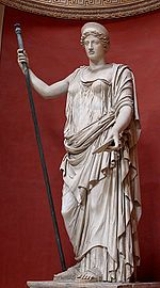
Demeter
Overview
In Greek mythology
, Demeter (d; Attic
Dēmētēr. Doric
Dāmātēr) is the goddess of the harvest, who presided over grain
s, the fertility
of the earth, and the season
s (personified by the Hours
). Her common surnames are Sito (: wheat) as the giver of food or corn/grain and Thesmophoros
as a mark of the civilized existence of agricultural society. Though Demeter is often described simply as the goddess of the harvest, she presided also over the sanctity of marriage
, the sacred law
, and the cycle of life and death
.
Greek mythology
Greek mythology is the body of myths and legends belonging to the ancient Greeks, concerning their gods and heroes, the nature of the world, and the origins and significance of their own cult and ritual practices. They were a part of religion in ancient Greece...
, Demeter (d; Attic
Attic Greek
Attic Greek is the prestige dialect of Ancient Greek that was spoken in Attica, which includes Athens. Of the ancient dialects, it is the most similar to later Greek, and is the standard form of the language studied in courses of "Ancient Greek". It is sometimes included in Ionic.- Origin and range...
Dēmētēr. Doric
Doric Greek
Doric or Dorian was a dialect of ancient Greek. Its variants were spoken in the southern and eastern Peloponnese, Crete, Rhodes, some islands in the southern Aegean Sea, some cities on the coasts of Asia Minor, Southern Italy, Sicily, Epirus and Macedon. Together with Northwest Greek, it forms the...
Dāmātēr) is the goddess of the harvest, who presided over grain
GRAIN
GRAIN is a small international non-profit organisation that works to support small farmers and social movements in their struggles for community-controlled and biodiversity-based food systems. Our support takes the form of independent research and analysis, networking at local, regional and...
s, the fertility
Fertility
Fertility is the natural capability of producing offsprings. As a measure, "fertility rate" is the number of children born per couple, person or population. Fertility differs from fecundity, which is defined as the potential for reproduction...
of the earth, and the season
Season
A season is a division of the year, marked by changes in weather, ecology, and hours of daylight.Seasons result from the yearly revolution of the Earth around the Sun and the tilt of the Earth's axis relative to the plane of revolution...
s (personified by the Hours
Horae
In Greek mythology the Horae or Hours were the goddesses of the seasons and the natural portions of time. They were originally the personifications of nature in its different seasonal aspects, but in later times they were regarded as goddessess of order in general and natural justice...
). Her common surnames are Sito (: wheat) as the giver of food or corn/grain and Thesmophoros
Thesmophoria
Thesmophoria was a festival held in Greek cities, in honor of the goddesses Demeter and her daughter Persephone. The name derives from thesmoi, or laws by which men must work the land. The Thesmophoria were the most widespread festivals and the main expression of the cult of Demeter, aside from the...
as a mark of the civilized existence of agricultural society. Though Demeter is often described simply as the goddess of the harvest, she presided also over the sanctity of marriage
Marriage
Marriage is a social union or legal contract between people that creates kinship. It is an institution in which interpersonal relationships, usually intimate and sexual, are acknowledged in a variety of ways, depending on the culture or subculture in which it is found...
, the sacred law
Religious law
In some religions, law can be thought of as the ordering principle of reality; knowledge as revealed by a God defining and governing all human affairs. Law, in the religious sense, also includes codes of ethics and morality which are upheld and required by the God...
, and the cycle of life and death
Life expectancy
Life expectancy is the expected number of years of life remaining at a given age. It is denoted by ex, which means the average number of subsequent years of life for someone now aged x, according to a particular mortality experience...
.
Unanswered Questions

